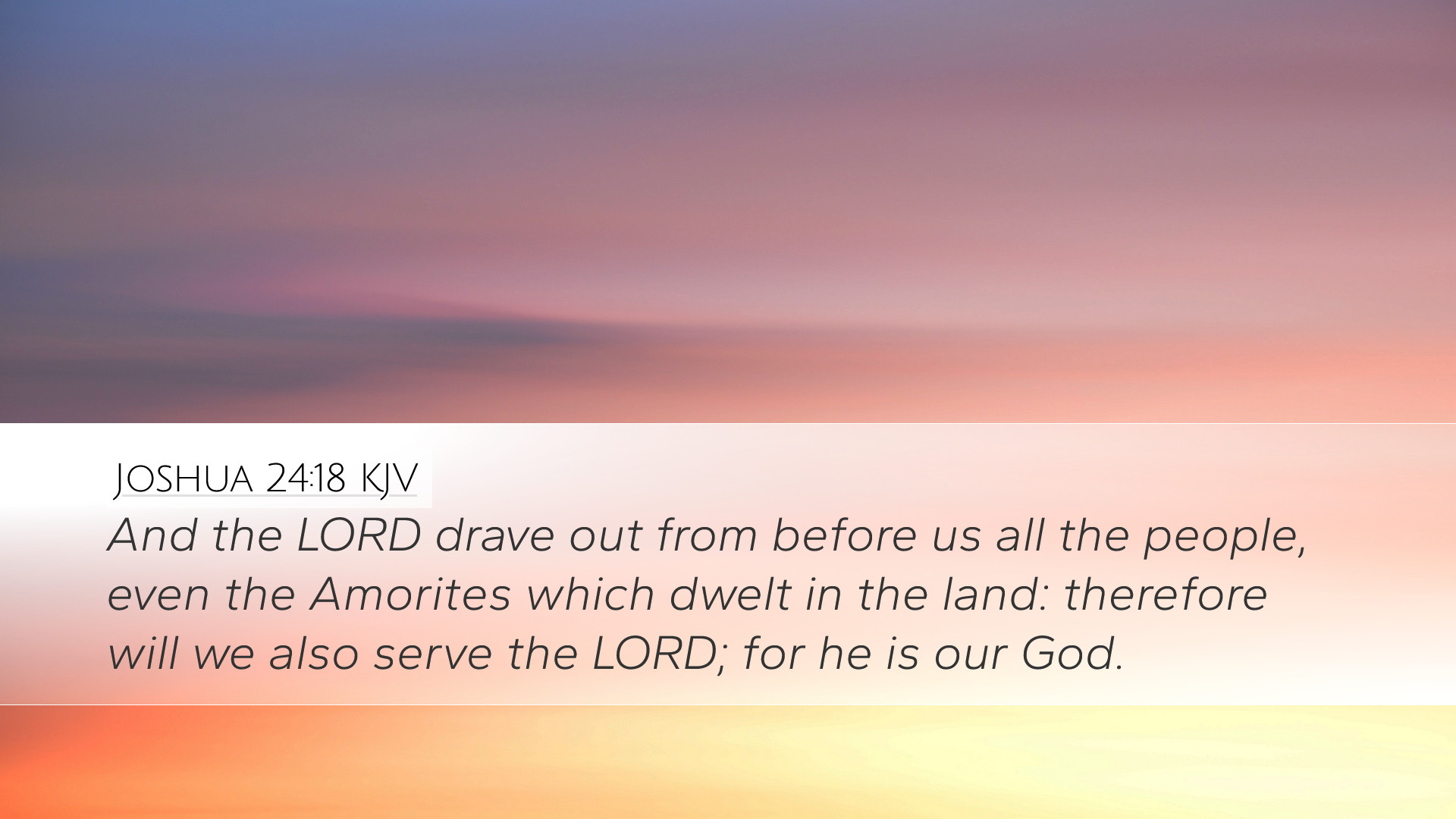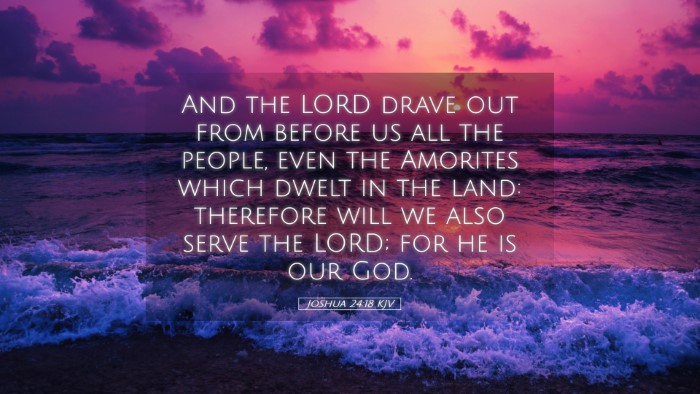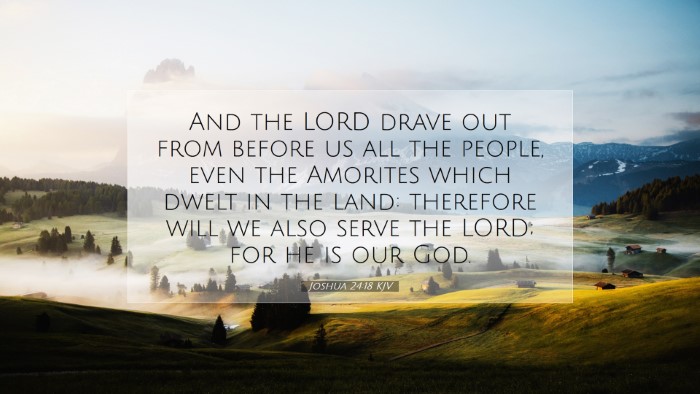Commentary on Joshua 24:18
Joshua 24:18 states, "And the people answered and said, 'God forbid that we should forsake the Lord, to serve other gods;'" This verse encapsulates the commitment of the Israelites to worship the Lord amidst the discussions of covenant renewal led by Joshua. In this commentary, we delve into the rich insights offered by esteemed public domain commentators such as Matthew Henry, Albert Barnes, and Adam Clarke.
Contextual Analysis
In the broader context of Joshua 24, Israel stands at a significant juncture. After a long journey through the wilderness and the conquest of Canaan, Joshua calls upon the Israelites to choose whom they will serve. His challenge is crucial, urging them to reflect on their history and the faithfulness of God compared to the failed promises of idol worship. This moment crystallizes their identity as God's chosen people and emphasizes the necessity of faithfulness to Yahweh.
Matthew Henry's Insight
According to Matthew Henry, this verse represents the resolve of the Israelites to remain steadfast in their allegiance to the LORD. Henry emphasizes the significance of the collective response of the people, noting that they understood the seriousness of their commitment.
-
Collective Responsibility: Henry points out that the vow made by the people reflects a corporate responsibility. It was not only an individual declaration but a communal commitment to forsake all other idols.
-
Awareness of Consequences: The phrase "God forbid" serves as an indication of their awareness of the severe consequences that come with forsaking God. Henry reminds readers that true worship demands a recognition of the risks associated with idolatry.
-
Historical Context: The choice faced by the Israelites comes after a recounting of God's past faithfulness in their lives. Henry argues that remembrance of God's mercies fuels the people's desire to remain devoted.
Albert Barnes' Perspective
Albert Barnes provides a practical exposition on the implications of the Israelites' declaration. He emphasizes that their bold affirmation stemmed from a trust in God's sovereignty, alongside a clear rejection of foreign gods.
-
Trust in God's Sovereignty: Barnes interprets the people's affirmation as an expression of their trust in God's providence and authority. Their declaration is rooted in the understanding that God alone is deserving of their worship.
-
Contrast with Idolatry: Barnes highlights the crucial distinction between serving the Lord and serving other gods. He asserts that this decision is foundational to the identity and spiritual integrity of the Israelite nation.
-
Practical Implications: The response is seen not merely as an emotional affirmation but as a decisive action intended to guide their covenant relationships following Joshua’s exhortation.
Adam Clarke's Analysis
Adam Clarke delves into the rhetorical nuances of Joshua's appeal and the significance of the people's vow. Clarke explores how this decision has theological ramifications for future generations.
-
Rhetorical Structure: Clarke notes the way Joshua frames this appeal, urging the people to weigh their options carefully. He suggests that the gravity of this moment calls for serious contemplation of their commitment to the covenant.
-
Theological Implications: Clarke illustrates that their response was more than just a momentary pledge; it served as a renewal of covenant promises that would resonate throughout Israel's history.
-
Instruction for Future Generations: The acknowledgment of God's dedication and the rejection of other deities provides a template for future leaders in Israel. Clarke emphasizes the importance of teaching subsequent generations about these covenantal choices.
Theological Themes
The responses of the Israelites in Joshua 24:18 intersect with several major theological themes:
-
Covenantal Faithfulness: The ongoing commitment of God to His people is a recurring theme, urging believers to reflect on their own faithfulness.
-
The Danger of Idolatry: The struggle against idolatry remains pertinent. This passage serves as a cautionary reminder for readers today about the allure of modern 'gods' and priorities that can distract from divine worship.
-
Collective Identity: The acknowledgment of a corporate identity within faith communities is essential in maintaining the integrity of worship and community. The power of collective affirmation is vital in spiritual maturation.
Application for Today
For contemporary believers, Joshua 24:18 presents a compelling call to reflect on loyalty to God amidst competing worldviews. The insights from Henry, Barnes, and Clarke encourage believers to:
-
Evaluate Commitments: Regularly assess what or whom they are prioritizing in their lives and ensure that the choice to serve the Lord is upheld.
-
Teach Future Generations: Just as the Israelites committed to teaching their children, today’s believers are called to impart faithfulness to future generations.
-
Cultivate a Community of Faith: Engage actively in a church community that supports collective worship and accountability in following God.
Conclusion
Joshua 24:18 serves as a poignant reminder of the necessity of commitment and faithfulness toward God. The combined insights of Matthew Henry, Albert Barnes, and Adam Clarke offer a rich tapestry of interpretation, providing pastors, students, and scholars with profound depths to explore in this seminal text. As believers respond in faith, they are beckoned not only to recollect God’s past acts of deliverance but also to respond faithfully to His present call to serve Him alone.


